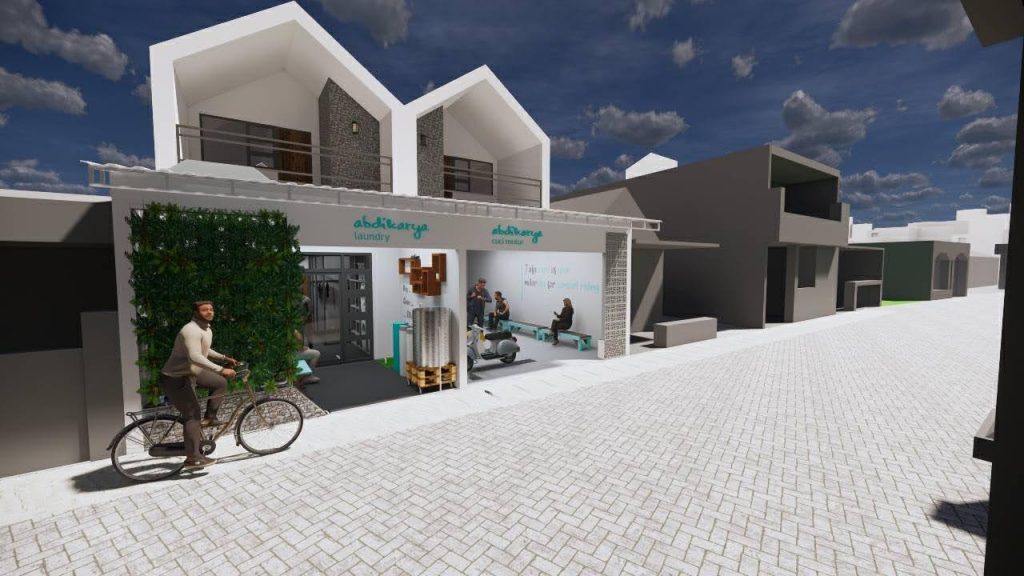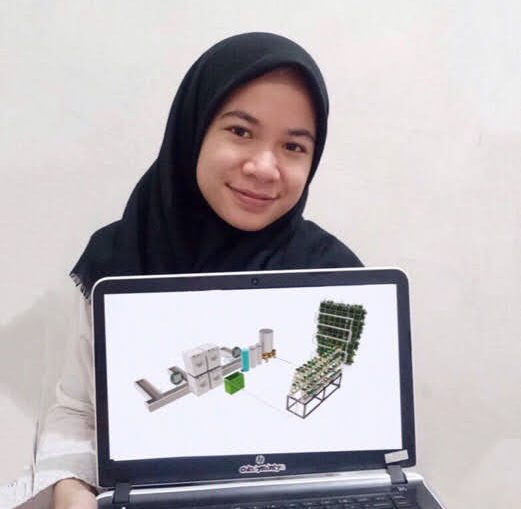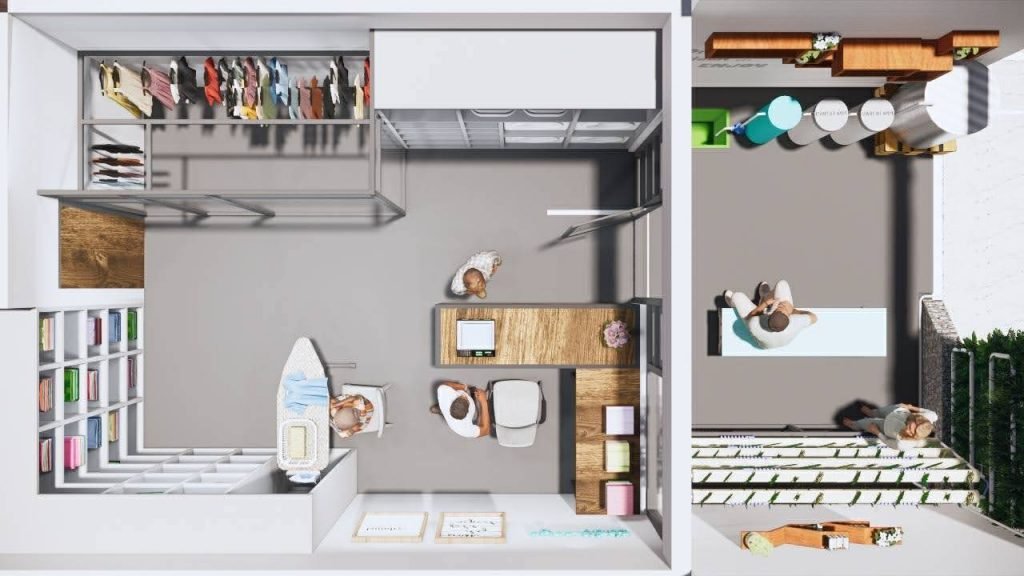Abdi Karya ITS Designed A 3R-based Laundry Wastewater Treatment Plant

The laundry’s outdoor design is equipped with a wastewater treatment plant with the 3R principle designed by the ITS Abdi Karya team.
ITS Campus, ITS News – The proliferation of small-scale laundry businesses seems to have created new problems because they also produce hazardous waste and pollute the environment. Departing from that problem, the Abdi Karya team of the Institut Teknologi Sepuluh Nopember (ITS) designed a wastewater treatment plant for laundry and based on reuse, recycle, and recovery (3R).
The Abdi Karya team leader, Cindy Synthia Putri, revealed that many laundry businesses currently do not have a proper wastewater treatment plant. The laundry waste that they produce tends to be thrown away without being treated first. This waste contains a variety of dangerous substances. “This content comes from a mixture of detergent and dirt on clothes,” said Cindy.
The hazardous content of the waste, according to Cindy, includes Biochemical Oxygen Demand (BOD), Chemical Oxygen Demand (COD), Total Suspended Solid (TSS), and phosphate. Cindy explained that BOD and COD’s high value could cause a deficit of oxygen dissolved in water. Meanwhile, TSS can make water turbid and block sunlight from entering. “Meanwhile, phosphate can degrade the life of aquatic biota and increase nutrients,” explained this student from the Department of Environmental Engineering.
Therefore, continued Cindy, the small scale laundry business requires a processing unit to reduce environmental pollution risk. The wastewater treatment plant designed by Cindy and team is portable. Also, this unit has a size that matches the willingness of a small-scale laundry room. “So it won’t take up a lot of space,” continued Cindy.

The Abdi Karya team leader, Cindy Synthia Putri, showing the initial design of a wastewater treatment plant for small scale laundry business.
More profoundly, Cindy explained their wastewater plant would collect the waste in a collection tank. The waste will be filtered using river sand through the biosand filter process. The processed water will then go through two times as the activated carbon adsorption process using coconut shell adsorbents. “Finally, the treated waste will be clean and can be collected into water reservoirs,” she said.
According to Cindy, their wastewater plant design is getting better thanks to the implementation of 3R. The processed water can be reused for watering hydroponic plants, washing vehicles, and re-flowing to the processing unit again. If the river sand started to get dirty due to the filter process, they could reuse the sand after washing it with clean water. “Meanwhile, the saturated absorbent produced can be used (recovery) as fertilizer,” he said.
Apart from Cindy, other ITS Abdi Karya team members are Nabila Putri R, Nandalita Alifia, and Oktsyavitto Adhitya from the Department of Environmental Engineering. Apart from them, there are Vaneti Kyash L and Wahid Ramadhan S from the Department of Architecture. Finally, there is also Ifarrel Rachmanda H, a student of the Department of Civil Engineering. “The seven of us managed to collaborate ideas into concrete designs,” said Cindy proudly.
Their hard work has brought achievements. The wastewater tank designed by the ITS Abdi Karya team has won the top prize in the Small Scale Business in Laundry and Batik category in the 2020 IPAL (Wastewater Treatment Plant) Innovation Design Competition on 18 September. In the competition held by the Ministry of Environment and Forestry (KLHK), Abdi Karya managed to outperform 68 other teams from national and foreign universities.

The inside plan of the laundry with the washing wastewater treatment and the 3R principle designed by the ITS Abdi Karya team.
In the future, the team with mentors Arseto Yekti Bagastyo ST MT MPhil, Welly Herumurti ST MSc, and Ervin Nurhayati ST MT PhD hope that their designs will not only be completed in competitions. Cindy hopes the team can further develop the innovation they have initiated until it is more mature to use laundry business activists. “I hope the impact of this waste pollution can be overcome with our IPAL,” he concluded. (dik/sel/ITS Public Relations)
Related News
-
Faithful in Times of Joy and Sorrow, Married Couple Graduate with Doctorates Together at ITS
ITS Campus, ITS News — As though guided by one heart and one soul, Dr Hanugra Aulia Sidharta ST
October 06, 2020 20:10 -
ITS Wins 2024 Project Implementation Award for Commitment to Gender Implementation
ITS Campus, ITS News —Not only technology-oriented, Institut Teknologi Sepuluh Nopember (ITS) also show its commitment to support gender
October 06, 2020 20:10 -
ITS Professor Researched the Role of Human Integration in Sustainable Architecture
ITS Campus, ITS News –The developing era has an impact on many aspects of life, including in the field
October 06, 2020 20:10 -
ITS Sends Off Group for Joint Homecoming to 64 Destination Areas
ITS Campus, ITS News — Approaching Eid al-Fitr, the Sepuluh Nopember Institute of Technology (ITS) is once again facilitating academics who want
October 06, 2020 20:10
